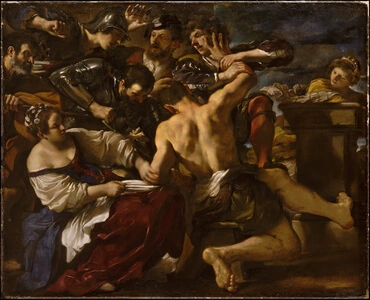1453. As regards 'Bethel being towards the sea and Ai towards the east, 1
' meaning that His state was still obscure, that is to say, so far as cognitions of celestial and spiritual things were concerned, it is one thing to be governed by celestial things, another to be governed by the cognitions of celestial things. Infants and children are governed, more so than adults, by celestial things because of the presence in them of love towards their parents and of love for one another, as well as of innocence. But adults are governed, more so than infants and children, by the cognitions of those celestial things, very many adults not being governed at all by the celestial things of love. Until a person is taught the things of love and faith, he dwells in an obscure state, that is, so far as cognitions are concerned. That state is described here by the statement 'Bethel' was 'towards the sea', that is, 'towards the west', and 'Ai towards the east' 'Bethel', as stated already, means cognitions of celestial things, but 'Ai' the cognitions of worldly things. The former are said to be 'towards the west' when they are in obscurity, for in the Word 'the west' means that which is obscure, while the latter are said to be 'towards the east' when they are in brightness; for in comparison with the west the east is brightness. There is no need to confirm that west and east have these meanings, as they may be evident to anyone without confirmation.
[2] That 'Bethel' means the cognitions of celestial things however may become clear from other places where Bethel is mentioned in the Word, as in the next chapter,
Abram went according to his journeys from the south even to Bethel, to the place where his tent had been at the start, between Bethel and Ai, to the place of the altar that he had made there. Genesis 13:3-4.
Here 'according to his journeys from the south towards Bethel' means advancing into the light of cognitions, and this is why no reference is made in this case to 'Bethel towards the west and Ai towards the east'. When Jacob saw the stairway he said,
This is none other than the house of God, and this is the gate of heaven. And he called the name of this place Bethel. Genesis 28:17, 19.
Here similarly 'Bethel' means knowledge of celestial things, for a person is a 'Bethel', that is, a 'House of God', and a 'Gate of heaven', when he is governed by the celestial things that have been present as cognitions. While a person is being regenerated he is undergoing introduction, which is effected by means of cognitions of spiritual and celestial things; but once he has been regenerated that introduction has been completed, and he is now governed by the celestial and spiritual things that have been present as cognitions. Further on it is said,
God said to Jacob, Arise, go up to Bethel, and dwell there; make there an altar to the God who appeared to you. Genesis 35:1, 6-7.
[3] Here similarly 'Bethel' means cognitions.
The presence of the Ark of Jehovah in Bethel, and the visits to that place by the children of Israel to inquire of Jehovah, Judges 20:18, 26-27; 1 Samuel 7:16, 10:3, have similar meanings. So also has the reference to the king of Assyria sending one of the priests whom he had deported from Samaria, who resided in Bethel and was teaching them how to fear Jehovah, 2 Kings 17:27-28.
In Amos,
Amaziah said to Amos, O seer, go, flee to the land of Judah, and eat bread there, and prophesy there. And do not prophesy any more in Bethel, for this is the king's sanctuary and this is a house of the kingdom. Amos 7:12-13.
[4] After Jeroboam had profaned Bethel, 1 Kings 12:32; 13:1-8; 2 Kings 23:15, Bethel had a contrary representation, as in Hosea 10:15; Amos 3:14-15; 5:5-7. As regards 'Ai' meaning cognitions of worldly things however this too may be confirmed from historical and prophetical parts of the Word, in Joshua 7:2; 8:1-28; Jeremiah 49:3-4.
Poznámky pod čarou:







